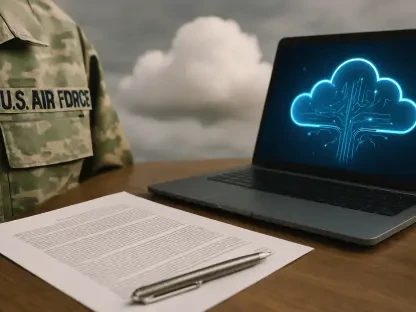Microsoft’s December Patch Tuesday has arrived, carrying with it a total of 74 updates, a critical zero-day vulnerability fix for Windows, and the attention of IT administrators and enterprises globally. This month’s updates span across various Microsoft products such as Windows, Office, and Edge but exclude Microsoft Exchange Server and SQL Server. IT administrators must give priority to these updates to ensure their systems remain secure and operational, especially with the presence of a zero-day vulnerability.
Overview of December’s Patch Tuesday
Release of 74 Updates
Microsoft has released a comprehensive 74 updates this month, spanning an array of products that include important security patches and stability enhancements. These updates address various issues and vulnerabilities across the software spectrum, ensuring that systems remain secure from potential threats. A key highlight is the critical zero-day fix for Windows desktops, which is imperative for IT administrators to prioritize due to the significant security risk it poses. Ensuring these updates are promptly applied will help maintain a secure operating environment for users.
Zero-Day Vulnerability: CVE-2024-49138
The zero-day vulnerability identified as CVE-2024-49138 is of critical importance in this month’s Patch Tuesday. This vulnerability, which impacts Windows desktops’ handling of error logs, poses a considerable security risk, making it essential for immediate patching. IT administrators are advised to move swiftly in deploying this patch to shield systems from potential exploits that could result from this vulnerability. The urgency of this fix highlights the importance of staying updated with the latest patches and security protocols in order to protect valuable data and maintain system integrity.
Product-Specific Updates
Windows, Office, and Edge
The updates rolled out for Windows, Office, and Edge are vital for the upkeep of security and functionality within these widely used products. With the zero-day fix for Windows taking precedence due to its critical nature, other patches for Office, Visual Studio, and Edge can be scheduled within the standard update routine. This approach balances immediate necessity and planned maintenance, making it easier for IT departments to manage the update process without overwhelming their system administration capacities. Proper implementation of these patches helps safeguard against potential vulnerabilities that could otherwise be exploited if left unpatched.
Absence of Updates for Microsoft Exchange Server and SQL Server
Notably, this Patch Tuesday cycle lacks updates for Microsoft Exchange Server and SQL Server, which is unusual given that these servers frequently receive critical patches. The absence of updates for these platforms this month means IT administrators should stay alert for any future releases that may address potential vulnerabilities within these systems. Continued vigilance is necessary to ensure that when updates do become available, they are promptly applied to maintain security and functionality. In the meantime, IT professionals should keep an eye on other areas and potential impacts until new updates are announced.
Known Issues and Mitigations
OpenSSH Service Issue
One of the identified known issues involves the OpenSSH service failing to start, which disrupts SSH connections and can impede secure remote access. Microsoft has provided several mitigation solutions for affected users, suggesting steps to alleviate the issue and restore functionality. IT administrators experiencing this problem should implement these recommended solutions promptly to maintain secure and efficient connections across their networks. Careful monitoring of these connections can help prevent disruptions and ensure continuous secure access.
Windows Server 2008 Update Warnings
For users operating on Windows Server 2008, there have been reports of warnings related to unsuccessful Windows Update completions. Microsoft is actively working to address this issue and anticipates a fix in the near future. To continue receiving support, many users will need to transition to the second stage of “Extended Support Updates” (ESU). This step is crucial for ensuring that systems remain updated and protected against known vulnerabilities. IT administrators should prepare for this transition and ensure compliance with support protocols to minimize disruption and maintain system security.
Major Revisions in December 2024
Microsoft QUIC Denial of Service Vulnerability
A significant focus of this month’s update includes two revisions, CVE-2023-36435 and CVE-2023-38171, related to the Microsoft QUIC Denial of Service Vulnerability. These updates are part of an ongoing two-year series of patches for the Microsoft .NET platform and demand extensive testing before deployment. Given their scope and potential impact on system performance and security, it is imperative that IT teams rigorously test these patches in a controlled environment to identify any issues and ensure they do not destabilize existing operations. This thorough testing process helps prevent unexpected disruptions and maintains the reliability of critical systems.
Windows LDAP Remote Code Execution Vulnerability
CVE-2024-49112 is another critical patch addressing a Windows Lightweight Directory Access Protocol (LDAP) Remote Code Execution Vulnerability. The patch was included this month because of an error in the documentation, leading to its duplication in the release notes. IT administrators should make certain this patch is part of their December update schedule to prevent potential security breaches. Keeping LDAP services secure is essential for maintaining efficient directory management and access control within enterprise environments. Without prompt patching, systems could be left open to exploitation through remote code execution.
HTTP/2 Rapid Reset Attack
The vulnerability CVE-2023-44487, addressing the HTTP/2 Rapid Reset Attack, has been updated to extend its scope to include all recent supported versions of Microsoft .NET and Visual Studio. This update is critical for developers and IT professionals to add to their development update release schedule. Ensuring that these platforms are secure protects against attacks that could potentially disrupt web communication protocols. IT departments should prioritize this patch to maintain the integrity of their development environments and prevent potential security breaches.
NTLM Hash Disclosure Spoofing Vulnerability
The revision CVE-2024-43451 focuses on an NTLM Hash Disclosure Spoofing Vulnerability that impacts older Windows Server versions, specifically 2008 and 2012. This update has garnered significant attention due to its potential implications and the external technical support it requires. Careful consideration and thorough testing are necessary before deploying this patch to safeguard sensitive data and prevent spoofing attacks. Addressing this vulnerability is vital for maintaining secure authentication protocols within enterprise environments, ensuring that older servers remain protected against modern threats.
Lifecycle and Enforcement Updates
Absence of Product or Security Enforcements
For this update cycle, Microsoft has noted the absence of product or security enforcements, allowing IT administrators a measure of relief. Without the pressure of additional enforcements, they can concentrate on the critical updates and known issues without being overwhelmed. This period of respite provides an opportunity to focus on diligent patching and system testing, ensuring systems are secure without the added load of new security enforcements. Overall, it grants IT departments the time and resources to address major vulnerabilities effectively.
No Non-Security Preview Release for December 2024
Microsoft has also announced that there will be no non-security preview release for December 2024, with normal monthly servicing set to resume in January 2025. This break in the release schedule gives IT administrators a brief respite during the busy holiday season, allowing them to focus on current critical updates without the distraction of additional previews. This pause provides the opportunity to ensure all critical updates are appropriately addressed before the new year, maintaining a secure and stable environment without additional pressures.
Testing Guidance for IT Administrators
Networking and Remote Desktop Services
Key components receiving updates in this cycle include RDP connections, RPC pathways, DNS signing key operations, and WAN port validations. IT administrators must conduct thorough tests to ensure these updates do not inadvertently disrupt network functionality. Robust testing protocols should be implemented to verify that remote desktop and networking services remain stable and secure. By systematically addressing potential disruptions through careful testing, IT departments can maintain seamless operations and protect against possible vulnerabilities.
Local Windows File System and Storage
Minor changes necessitate rigorous testing of the ReFS system and Input Method Editors (IMEs) for Japanese formats, especially due to the handling of non-English characters. These updates, although seemingly small, require careful validation to prevent any issues that might arise from incorrect character handling or system operations. IT administrators should focus on these aspects during their testing phases to ensure smooth functionality and avoid potential disruptions caused by minor updates. Proper implementation helps maintain system efficiency and reliability.
Virtual Machines and Microsoft Hyper-V
Updates to virtualization drivers call for detailed traffic testing and monitoring, with primary testing focused on validating remote network traffic. While light testing is required for file system and Hyper-V changes, ensuring these updates do not negatively impact virtual environments is crucial. By conducting careful tests, IT administrators can confirm the stability of their virtual infrastructures and the safe integration of new drivers. This process helps prevent any adverse effects on the performance and security of virtual machines, maintaining a dependable virtualized environment.
Product Family Updates
Browsers: Microsoft IE and Edge
Microsoft released its December Patch Tuesday updates, delivering a total of 74 fixes, including a crucial zero-day vulnerability patch for Windows. This release has captured the attention of IT administrators and enterprises worldwide. Spanning a range of Microsoft products such as Windows, Office, and Edge, the updates are notably missing patches for Microsoft Exchange Server and SQL Server.
IT administrators should prioritize these updates to maintain system security and functionality, especially given the presence of a zero-day vulnerability that could be exploited if not addressed promptly. Ensuring that all systems are up-to-date with the latest patches is critical for protecting sensitive data and maintaining smooth operations. Staying on top of these patches is a key part of IT management and helps in guarding against potential security breaches.
In conclusion, the December Patch Tuesday is vital for securing various Microsoft products, emphasizing the importance of timely and comprehensive updates to safeguard enterprise environments.









